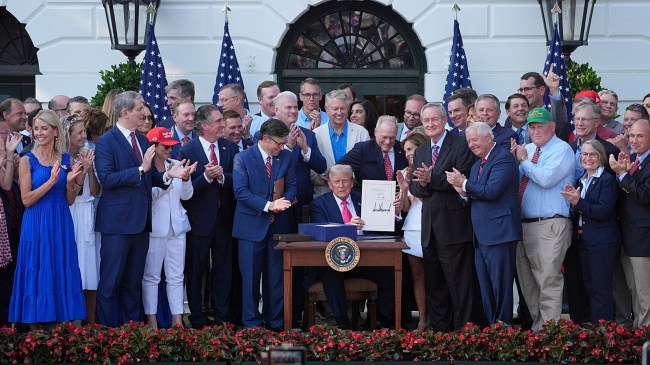Opinion The ‘beauty’ of Trump’s One Big Beautiful Bill may lie only in the eye of the beholder
The Bill seems set to deliver a positive macroeconomic impact, but the optimism gets pared down when considering the implications of these measures for low-income households and for the future of the green economy
 Embarking on a journey to “make America great again”, Trump unveiled the One Big Beautiful Bill (OBBB). The Bill quickly turned friends into foes, not least among policy experts, who dread the large fiscal costs
Embarking on a journey to “make America great again”, Trump unveiled the One Big Beautiful Bill (OBBB). The Bill quickly turned friends into foes, not least among policy experts, who dread the large fiscal costs President Donald Trump’s initiation at the White House was a promise contrary to the new world vision of stable diplomatic ties, greener economies, free trade and reversing decades of tax cuts. Embarking on a journey to “make America great again”, Trump unveiled the One Big Beautiful Bill (OBBB). The Bill quickly turned friends into foes, not least among policy experts, who dread the large fiscal costs. The OBBB, now passed by both houses of Congress and soon to be a reality, proposes to raise the debt ceiling as well as extend tax cuts and deductions introduced by the Tax Cuts and Jobs Act, 2017, which are set to expire this year. The proposed tax cuts come at the cost of Medicaid, the food stamps programme and energy tax credits, all of which are expected to shrink. The Committee for a Responsible Federal Budget, a Washington-based non-profit, estimates that the tax changes, if temporary, will cost $3.4 trillion in primary deficits over the next decade and add $4.1 trillion to current debt. In sharp contrast, the Joint Committee on Taxation, at the request of the Senate GOP, has pegged the costs at a far lower $442 billion. This is mainly arrived at through innovative accounting.
Under all estimates, the Bill seems set to deliver a positive macroeconomic impact, although the optimism gets pared down when considering the implications of these measures for low-income households and for the future of the green economy. The Joint Committee on Taxation estimates that the resources available to households in the lowest decile will decrease, whereas that for the top decile will increase. The reduction of taxes on overtime work and tips through 2028 is meant to ensure inclusivity. Yet this is quite insignificant in comparison to the fiscal impact of other tax measures.
With Trump’s assurance that America was going to drill away, the removal of tax benefits to the clean energy sector is hardly a surprise. The OBBB is set to close the existing commercial and consumer tax credits under the Inflation Reduction Act (IRA). The obsolescence of the measure could be ill thought-out as the American shale industry is at the mercy of OPEC.
To “make America great again”, Trump advocated recklessly for inward-looking policies such as tariff hikes, taxes on remittances and immigration control, all of which are attempts to negotiate trade deals bilaterally. This includes the retreat from the global tax deal while getting countries like India and Canada to stall their efforts to apply a digital services tax. The proposals to apply additional income taxes on payments made to persons of a jurisdiction applying “unfair foreign taxes” — such as a digital services tax or top-up taxes on payments taxed less than the global minimum rate — are clever negotiation tactics that seem to pay off making it a propitious time for large US corporations.
Caught in the fire is the Federal Reserve, which has adopted a wait-and-watch approach. The tariff, if carried through, can set off inflationary effects that may transmit slowly and may be exacerbated where international oil prices spike again if tempers soar in West Asia. As the world watches the US manoeuvre through international political and domestic economic headwinds, there is no doubt that US debt is expected to rise, more so if defence budgets are to grow. But is the world willing to hold this debt? The US-Iran conflict has further convoluted diplomatic ties in the region and has economists guessing about what this may mean for the future. If political stress flares, central banks will have to resume an attentive position. If that be the case, the US will also have to rethink its borrowing plans and tax cuts. The yield of the 10-year US treasury is among the highest in its S&P rating class, and with the recent Moody’s rating cut, the question is if it can borrow additionally at prevailing costs. A pause on interest rate reductions would raise the costs of borrowing. In spite of the elevated interest rates that pose a domestic fiscal problem, a third of US treasuries are held abroad and are largely with Japan, China and the UK. The willingness of these countries to buy the T-bills will also determine the US’s prospects of delivering tax cuts. Given that the US is no longer playing a reliable arbiter, with policy driven by temperament, the currency of its government securities may not be unaffected. The promised return of economic glory may be delayed for the US and for now the beauty of the bill may only lie in the eye of the beholder.
The writer is associate professor, NIPFP



